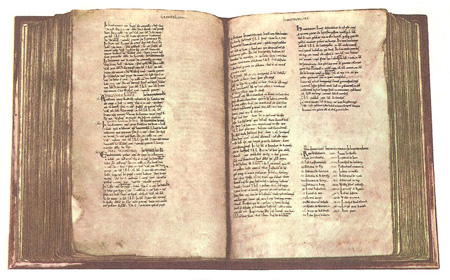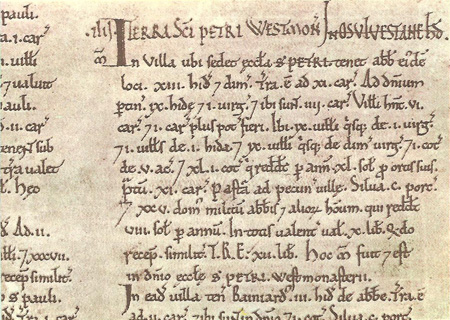Domesday Book

The Great Domesday Book. The results of the survey ordered by William the Conqueror were collected into two volumes. This is the larger one. Below: An entry relating to Westminster.

A page in the Domesday Book relating to Westminster.
William the Conqueror landed in England in the year 1066, at the head of an army of Frenchmen. He defeated Harold, King of the English, at Hastings, and was made King in his place. But he did not conquer England in a single year; there were many revolts, and it took a long time before he established himself properly. In the meantime his followers seized by force many lands which had belonged to Englishmen. Sometimes they quarreled bitterly over whose the lands should be, and much blood and money were wasted in their disputes.
Survey of the land
About 20 years after the battle of Hastings King William decided to settle all these quarrels, and at the same time to take stock of his new kingdom. He ordered a great inquiry to be made, to discover the name and owner of every estate in the kingdom, and the value of the property. This was the famous Domesday survey, which William launched at Christmas in the year 1085, when he had 'deep speech' about his plan with his councilors at Gloucester. It was decided to send out groups of men all over the country, to find out who owned the land in each county, and how much things had changed since 1066.
The country was divided into seven areas, and to each was sent a group of inquirers, who were called the Commissioners of Domesday. When the commissioners arrived in a county, all the important men came to meet them; besides this, from each village in the county came six ordinary men with the priest and the bailiff. The commissioners asked these people to tell them all about their village, and a clerk whom they had brought with them wrote down what was said. William had given the commissioners a list of questions which they must ask: who owned the land now, and who had owned it before 1066; how much land there was, and how many oxen and ploughs there were to till it, how many woods and ponds there were, and how much common land for the villagers' animals to graze on. William's men even asked how many pigs the villagers owned.
When the commissioners had gathered all the information they wanted in their area, the details were collected into a book describing the area. The books for each area were then sent to the King's Treasury at Winchester. There the King's clerks copied into one volume all that they thought was the most important. This volume was known as the Great Domesday Book. In each county it listed the names of all the great men who owned estates, starting with the most important of all, the King himself. Then it told how many men there were on each estate, and what their duties were; how much the estate was worth, and who it belonged to before the Normans came. But the answers which the commissioners for East Anglia collected were never copied into this book; they were preserved in the book in which they were originally entered, which is known as Little Domesday Book.
In mediaeval times the two volumes of Domesday Book were always kept at the Treasury. When this was moved from Winchester to Westminster, the book was taken too, for the King's officials were always consulting it, to settle lawsuits over estates, or to decide what special rights the King had in the various counties, and so on. Although some parts of the country, such as London, were left out, it is still probably the most complete single survey of all England that has ever been made, and it tells us more about what our countryside was like in the past than any other book. Today you can see the Domesday Book in a glass case at the Public Records Office in London. It was nicknamed Domesday Book because, when it was made people thought it contained even more details than there would be in the book where each man's life and doings would be found written on doom's day, the Day of Judgment.
